On Aug. 26, 1869, the Oak Bluffs Land and Wharf Company, an energetic corporation which had bought up acres of the lovely woods and meadows and shore front stretches of what is now Oak Bluffs, subdividing them into house lots, sold one of those lots, 69 Pequot avenue, to Lydia B. Smith of New Bedford.
It was sold for $100, with the stipulation that a dwelling house be erected thereon within two years, to be used exclusively as a residence for a private family.
Two years later Lydia B. Smith had not yet erected a dwelling house, and in consideration of the sum of $25, the Land and Wharf Company extended the time for building for an indefinite period.
Lydia B. Smith probably asked for this extension to facilitate the sale of her property to its next owner, Henry B. Fisher. The price is not included in the record of sale. But on the same day - Aug. 29, 1871 - the deed was recorded, Henry B. Fisher conveyed the parcel of land to William Lewis of Tisbury in consideration of $350. A month later William Lewis transferred the lot to Charity B. Norton in consideration of $400. The deed, however, was not delivered until April 10, 1883.
Charity B. Norton held the property until March 8, 1892 when a certain parcel of land in that part of Cottage City known as Oak Bluffs, numbered 69 Pequot, on a plan drawn by R. Morris Copeland, was conveyed to the town of Cottage City for $225.
For Less Than She Paid
That Charity B. Norton sold this lot for less than she had paid for it is interesting. Why she did so must remain a mystery. In any case, it was on this lot, with the condition no longer in the deed that only a dwelling house be erected, that the town of Cottage City, so named in 1880 after its separation from Edgartown, erected its town hall.
On the ground floor was Fire Engine Number One. On the floor above were administrative departments.
In 1907 came the change of the town’s name to Oak Bluffs. For nearly 60 years thereafter, the town conducted its affairs at the Pequot avenue location.
In 1966, with the new town hall in occupancy, a special town meeting authorized the sale of the old building, which passed into private hands. It remains unused and was soon sold again. Now, it has been resold to its previous owners, the Cottagers, who have ambitious hopes for its future.
The Cottagers, a women’s group, are cottage owners and summer sojourners who, over the years, have contributed much in time and money and creative energy to community concerns. They plan to make their building a center of activities that will add to the town’s fine image of racial cooperation, and they welcome all whose talents can fill some capacity.
As the sale becomes known, there are those in whom memory sharpens, and old tales group themselves for retelling. The past is often linked with a parent’s past, and the eras spanned are a rich total of time.
Faces Hartford Park
The old town hall faces Hartford Park, one of the lovely small parks add charm and give dimension to many streets.
Mrs. L. E. Dow of Oak Bluffs, who is 82, recalls that it was Justice Oliver Wendell Holmes who saved this park for the neighboring house-holders when he handed down the decision that those meadows that had been designated parks must so remain.
Mrs. Dow has a lively recollection of the fence that once separated the Camp Ground from the unsanctified section called Oak Bluffs. It was, as Mrs. Dow describes it, the fence that kept the holies in the unholies out.
Miss Ethel Barney, a Camp Ground resident since her birth, and a classmate of Mrs. Dow, recalls that fence, too, as well as the loose slats somewhere along it that enabled those on the redeemed side to scuttle through to see how those on the other side comported themselves at night.
Though lot 69 Pequot was beyond the fence, which ran in back of the Arcade and the Island House, its early deeds included many Camp Ground restrictions.
Antone H. Alley, who was selectman for 27 years prior to his retirement three years ago, is now 82, the same rewarding age as Miss Barney and Mrs. Dow, and their classmate from first grade. Like them he remembers well when district court was held in the old town hall with Judge Edmund G. Eldridge presiding.
Two Jail Cells
There are still two jail cells on the lower floor. They are not side by side, having been planned for male and female occupants. Both open into rooms where other business was conducted. The occasional prisoners could while away the time with all comers, free to follow their normal pursuits all day, and only having to return to their cells at night.
Fire Engine Number One was pulled by a pair of horses which spent their grazing time in a nearby pasture. Fred White, husband of Liz White, tells of a summer in his childhood when the fire horses were owned by Antone Alley and the late George Frye Sr., father of the recently deceased George Frye.
Mr. Alley had a store that is now Our Market, but was the Alley’s Market. Mr. Frye’s place of business was the shoe repair shop that is still in family hands. When the fire alarm sounded, Mr. Alley and Mr. Frye would fling off their cobbler’s and butcher’s aprons, and race for the pasture to fetch their horses to the firehouse, a procedure which long practice had perfected to record time.
One August day 8-year-old Freddy White, who was a playmate of the little Alley boy and the little Frye boy, was invited to come along when they boldly decided to borrow the fire horses and find a place to play circus. The Island boys were showing off before the slicked up summer kid. They could ride bareback. Freddy couldn’t ride at all. They could ride a pair of horses that were like greased lightning. With Freddy hoisted up behind the Alley boy, they were off and well away. Where-upon the fire alarm chose this day and this hour to ring.
Ran for Their Horses
Mr. Alley and Mr. Frye ran for their horses, which were not where they had last seen them. The horses heard the alarm, whirled toward the sound, dropping little boys off their backs, and galloped off in all directions, trying to get back to where the summoning bells said they should be.
Fortunately the fire was not disastrous. The running horses and their running masters finally arrived at the same spot, braked to a halt, paired off, and made their dash to the waiting fire wagon, with an excited crowd running behind.
In those days a little boy’s posterior was not sacred. Everybody thought a little boy was made of nothing but mischief anyway, and that a spanking was good for his character. The three little boys were spanked until they were too sore to sit down. In Freddy’s case it was double punishment. After his first experience on a horse, he was sore enough without a spanking.
In recalling the fire fighting equipment of an earlier day, Miss Barney remembers when a pail of water had to be placed on the front stoop of every Camp Ground house as a nightly precaution. When the watchman made his rounds, he carefully noted any breach and reported it to the overseers.
Miss Barney’s father, David J. Barney, was selectman and assessor for many years. The old town hall was on his daily schedule. He was one of the town’s successful businessmen, dealing in coal, then an indispensable commodity, and supplying the town hall, which had pot-bellied stoves, and later a coal furnace. If there was any conflict of interest, nobody had ever heard of it.
Grew Up in New Town
Though Miss Barney, Mrs. Dow, and Mr. Alley were not born when Oak Bluffs was separated from Edgartown and became Cottage City, they were born some six years later, and grew to young manhood and womanhood while the new town bore that name.
Miss Barney says without hesitation that it was a Henry F. King of Boston who armed himself with a petition and spent that summer collecting signatures to change the name of Cottage City to Oak Bluffs. He disliked the connotation of the word “city.” It seemed unsuited to this little town of scattered houses, and meadows, and woods, and beaches. The juxtaposition of “cottage” and “city” troubled his ear, too. His own cottage on Seaview avenue faced the infinite sea. To him there could be no more agreeable name than Oak Bluffs for the whole of the town instead of one special section. In 1907 the Massachusetts legislature made the change.
Mrs. Dow believes that Oak Bluffs was the first real summer resort in this country, in that it established its appeal as a vacation place before a year round population grew up around it to maintain it.
As a site for religious renewal it was self-sustaining. At first the faithful brought their own food to last their stay. They brought their own tents. But when many among them began to find the sea air as bracing to the body as the preaching was to the soul, these two-week toilers in the vineyard of the Lord began to backslide into summer-long vacationists on a Vineyard of broader dimensions.
For this longer and less austere stay, many more of the conveniences of easier living were required, and a permanent population was needed to keep wheels turning while the summer people were away, and when they returned to relax from city complexities.
The prime requirement was a solid structure. Much of the lumber used to build these earliest Oak Bluffs cottages was brought from Maine, Mrs. Dow recounts, by the whaling captains of Edgartown, who made this operation a very gainful sideline.
Miss Anna L. Oliver, town clerk of Oak Bluffs, sits in her fine office in the new town hall and remembers her 33 years at her cluttered desk in the old town hall as the happiest time of her life. She was very young when those good years began, and everything reflected her shining expectancy.
Above her desk in her present office hangs a painting of the old town hall presented to her by the artist Joy Crozier Stuart, who knew of her affection for all the picture called to mind. In the painting Mrs. Stuart has restored the old building to its original clarity of color. If a fresh coat of paint can do as much for the real life building as an artist’s brush has done on canvas, its early form and grace may be recaptured.
Maggie Alston, Cottager president, Liz White, past president, and chairman of the budget and finance committee, who worked so hard and productively to find a building, and then worked just as hard at Cottager meetings to effect its purchase, deserve much credit for this forward step the Cottagers have taken. Thelma Smith, a founder and first president of the Cottagers, and co-chairman of the budget and finance committee, did much to rally support from the membership. Lucille Lippman, member of the committee, and Dorothy Allston, vice-president of the Cottagers, were untiring helpers in this good cause.
The building is said by the knowledgeable to be well constructed and in good condition. The changes and improvements that may be necessary are likely enough within the realm of the possible. Most gratifying is the friendly interest that the townspeople have expressed, and the voluntary cooperation offered by the town officials. The Cottagers hope to make a lasting contribution.

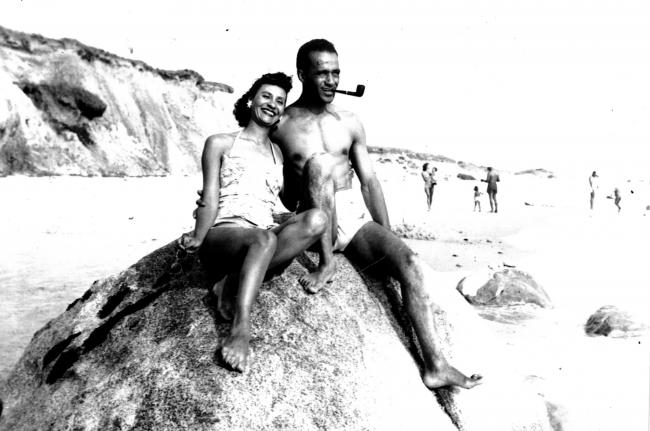


 1 comment
1 comment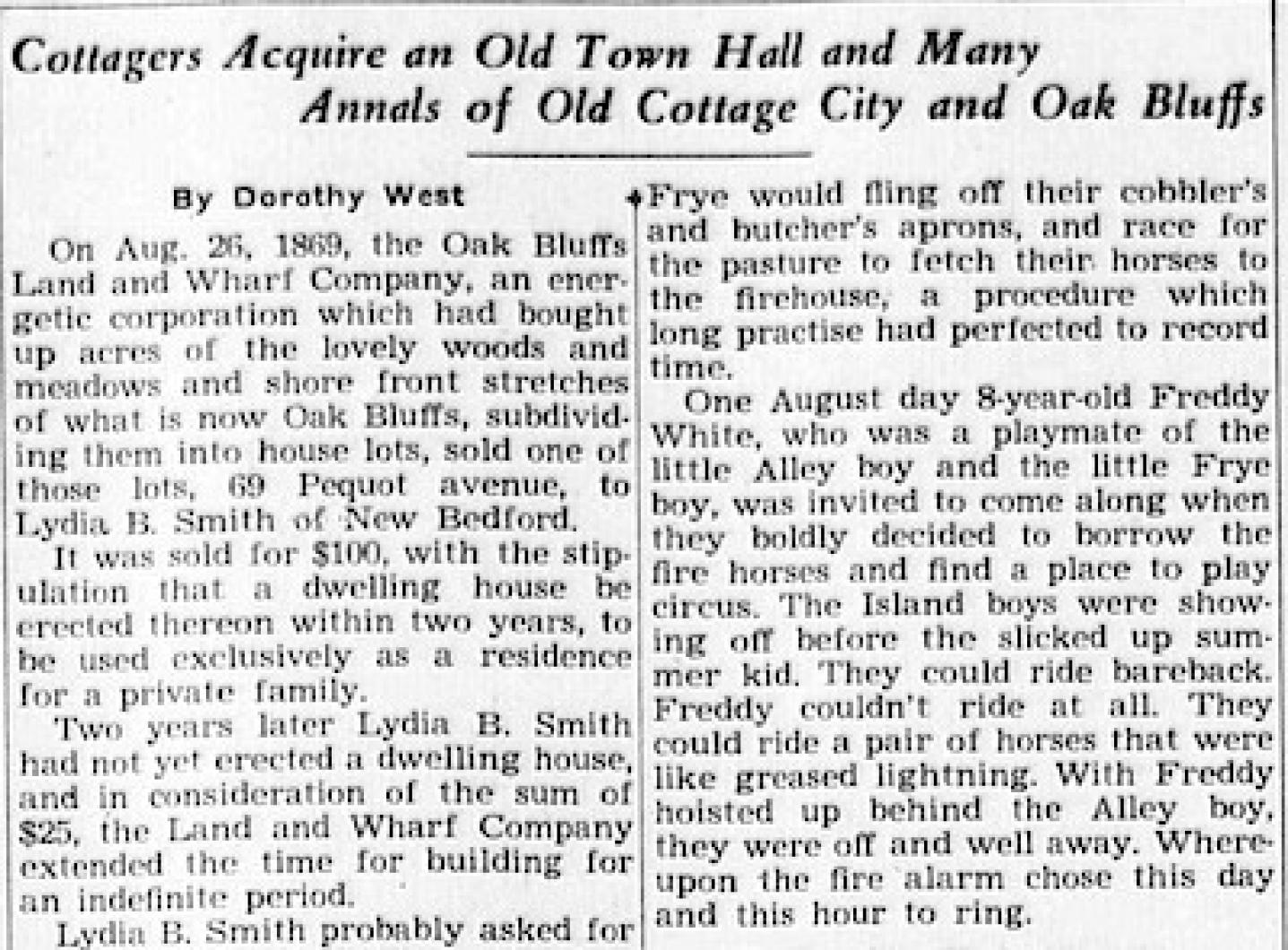
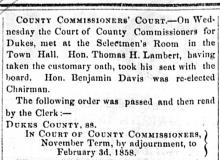
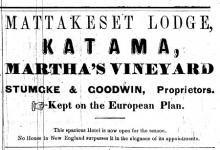
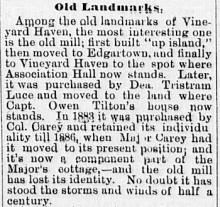
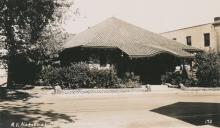
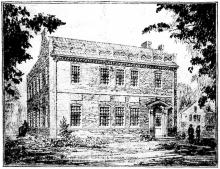
Comments (1)
Comments